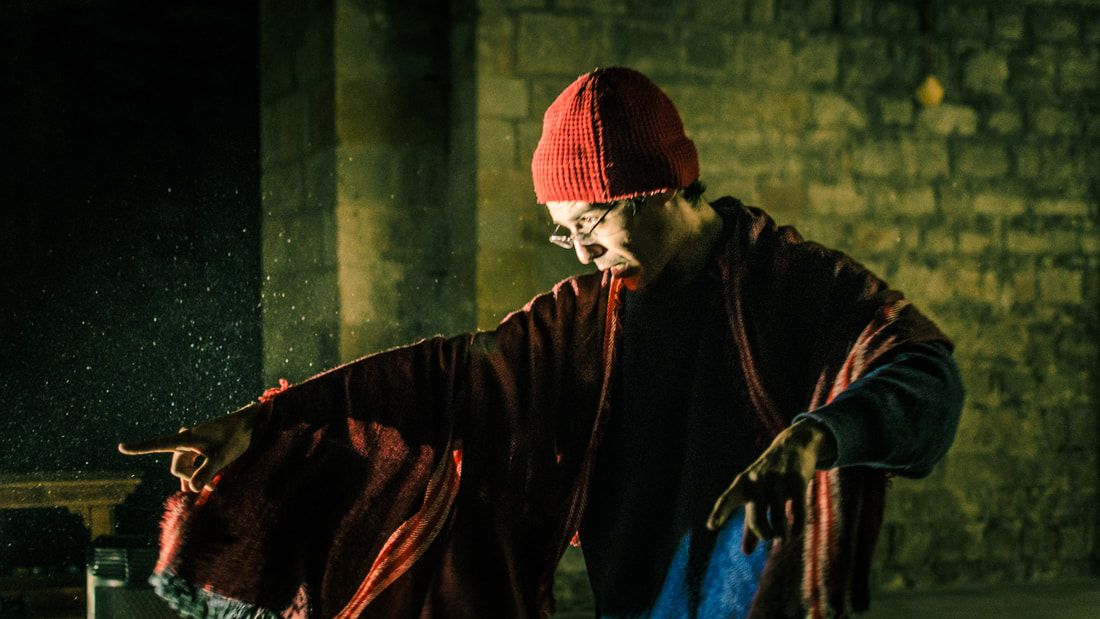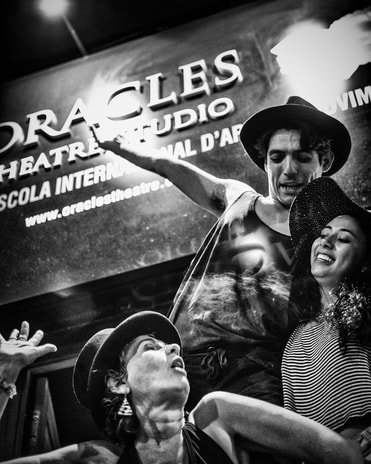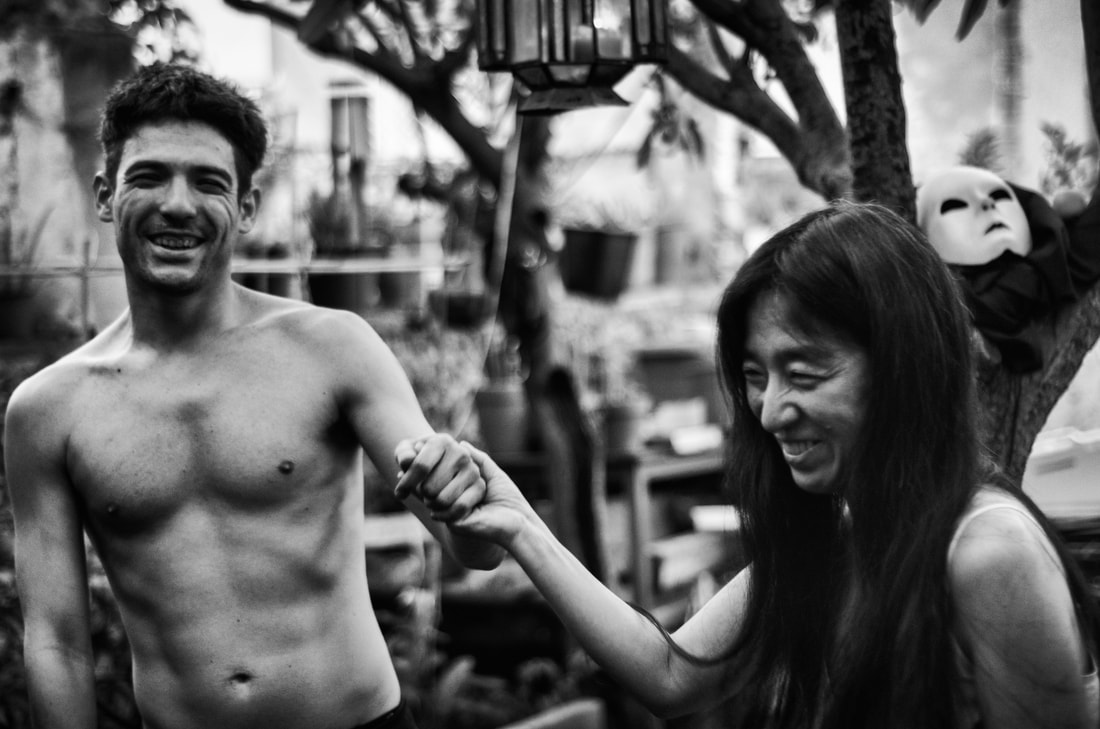Biography
ORLANDO WHALES
|
Dream artist in physical theatre and movement. Actor, director and playwright. Researcher of the symbols and images of the Tarot. Creator of the Onyric Theatre based on the lucid dream and director of ORACLES Theatre.
He takes his first steps in the theatre as a child. At 9 years old, he writes, directs and presents his first performance, where he plays a magician. As of this date, his life is oriented towards the creation of new worlds, whether through words, action or imagery. His fascination with the actor's capacity for metamorphosis led him to move from dramatic literature to acting. At the age of 25 he moved to Barcelona to study theatre. The first group he creates, in 2012, is called ONNAGATA, with which he performs the solo of MADAME HO LEE (Ed. Carena), a masterpiece as a playwright and performer that shocks the public with an analysis of child prostitution.
This group is followed by the founding of his company ORACLES TEATRE, which takes its name from the play Oracles by director Enrique Vargas, for whom he worked as an actor/inhabitant during 2012-13. In this work, based on the Tarot, he learns and deepens his understanding of the language of symbols, anthropology, sensory poetics and the creation of dramatic textures, adding knowledge to his background in the psychology of myth and archetypes. ORACLES TEATRE allows him to launch his first work as a director: DIÀLEGS DE DALT I DE BAIX (Ed. Onada), with which he obtains the VIII Prize of Theatre City of Sagunt. A metaphysical and philosophical work, the book is based on the reading of the text Orgy by Pier-Paolo Passolini and is inspired by the myth of Plato's cave. From this attempt to create a theatre of ideas, he begins to investigate in a territory completely unknown to him: the butoh dance. The body and the metaphysics of instinct. At the age of 30, he discovered butoh at the hands of dancer and choreographer Atsushi Takenouchi. If the soul exists, dance is its expression. Since then he has not stopped researching and reaching beyond his limits. 'Mitoh' is the Japanese name given by master Mushimaru Fujieda to his dance, which means 'step into the unknown'. Among the first choreographed butoh dance works are NOSTALGIA (2015), PANDORA (2016) and DUNSINANE (2016). In the end, Nietzsche's thought contained in The Birth of Tragedy drives him to travel to Japan in search of the roots of butoh dance and the Dionysian essence of Greek theatre. Upon his return to Barcelona, he founded, as director, the ORACLES THEATRE / STUDIO space, which opened to the public in 2017 as a research center for performing arts in movement, bringing artists such as Natsu Nakajima to its opening. As a theatre and music bar, the center becomes, over time, an independent space of reference in the Barcelona underground scene, located in the Poble Sec neighbourhood, and being the first host of the Catalan edition of the Iberian Festival of Butoh BLACK SOUL.
|
The summer of 2017 is one of great political and social instability in Catalonia as a result of terrorist attacks and the independence process. Aware of the historical moment, he decides to take butoh dance to the streets in his fight for freedom. On August 18 he organises 1000 I UNA FLORS: Marxa per la Pau (1000 AND ONE FLOWERS: March for Peace), a long butoh march with flowers and songs in defense of peace, on Barcelona's Ramblas.
ORLANDO WHALES spreads his wings as a creator, actor and dancer in ORACLES THEATRE between 2017 and 2018 with his own repertoire of works. As a director and performer, he stars in TRUC O TRACTE? (XVII Evarist García Theatre Award) together with the interpreter Natalia Bravo; as well as the popular and enigmatic HYDE CABARET, in which he explores Artaud's alterity through Dr. Jeckyll and Mr Hyde and the story of three women: Mariela Roi, Ariana Cárdenas and Lucía Callén. With butoh dance, he reinterprets literary classics from a contemporary, political and personal perspective. He deconstructs butoh and reinterprets it his way. He presents LA METAMORFOSIS (2017) at the Sala Beckett, and QUASIMODO (2017) at the Church of Santa Madrona (Barcelona), with music by the opera composer Keiko Fujiie, one of his great collaborators and muses. With QUASIMODO he is a pioneer by bringing butoh theatre and dance to a Catholic church. The work becomes iconic and is also presented at the alternative center Konvent 0 in Berga. It is followed by the works ÍCARO: The Last Flight (2018), HAMELIN: The Flautist and the Rats (2018), MORPHEUS: Sandman & The Seven Sins (2019) and PINOCCHIO: The Birth of the Actor, where inspiration drawn from Charles Chaplin and Kazuo Onho can be seen. They are solo works of undoubted artistic and personal maturity where he combines his combative and ferocious philosophical theatre with the transformation and magic of dream theatre.
He collaborates with the composer Keiko Fujiie in NAGASAKI-Wilderness Mute (Natura Morta), whose first version was shown in February 2018 at the Roman monastery of Sant Pau in Barcelona, the oldest church in the city. NAGASAKI is a butoh dance solo with music by Keiko Fujiie and video projection by Toni Casassas: a work created from the story of the protagonists of the atomic bombing. NAGASAKI travels to the US in September 2018, commissioned by the University of Antioch (Ohio), and supported by the United Nations. The success of PINOCCHIO led him to collaborate with the Cia TANGO AMADO in the show 'Regreso al Amor', directed by Armin Heinemann and choreographed by Verónica Palacios and Omar Quiroga; and to create together with Estella Mejía (Mei) La Bambola Cabaret, where he explores the original Paral·lel cabaret in Barcelona with resonances in Bigas Luna. Orlando Whales also has a degree in Catalan Philology from the University of Alicante (2004) and a Master's degree in Creative Writing from the Pompeu Fabra University (2010). As a teacher he has been linked to the University of Barcelona and has worked in institutes and schools. He currently performs, travels and teaches in different countries of the world together with other artists. He inspires them to discover his own myth ('story/tale' in its original Greek meaning), every step of the way and to embody in body, soul and spirit the story that each one carries within... |


